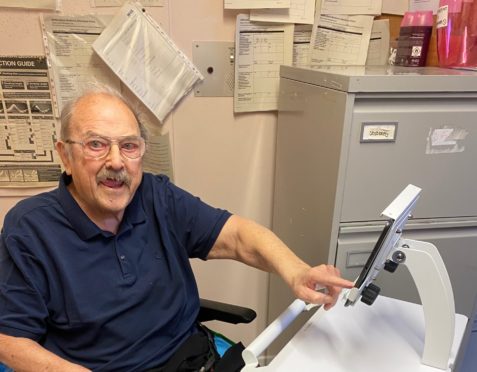Elderly hospital patients will be able to connect with their loved ones virtually as a new scheme is rolled out across the north-east.
Physical visits to hospitals were stopped in March to prevent the spread of coronavirus in the facilities.
At that time, the idea of “virtual visiting” was pioneered and has undergone trials at 25 wards in the region.
Under the initiative, iPad tablets have been supplied to patients who do not have their own device to connect to the internet or are too ill, frail or lack confidence to use the technology.
Ward staff have lent a helping hand to ensure they are able to work the machines, and delighted patients have hailed the venture as a success.
Health bosses have now confirmed it will be rolled out across all NHS Grampian sites over the next few months.
Jim Cameron, 84, is among those who have got to grips with Facetime in recent weeks, having had no prior experience with such technology.
The patient at Woodend Hospital in Aberdeen said: “It was great to be able to connect with my family and to see their faces again.
“It’s cheered me up no end and made me feel less isolated. It’s also helped reassure my family that I’m doing okay.
“I’d never used Facetime before so it took a little bit of getting used to but the staff were really helpful.
“It’s made being in hospital just now that much easier so I hope it is introduced to all hospital wards.”
Elaine Pyper, senior charge nurse at the Morningfield House ward where Mr Cameron is being treated said the drive had “made a huge difference”.
She added: “While we know it will never be the same as a physical visit, virtual visiting is about putting in place the best alternative we can in the current situation and it’s already making a huge difference.
“As health professionals we know that patient recovery is about more than just their physical symptoms – emotional wellbeing and the right support from their loved ones plays a huge role.
“We see that with our patients every day, which is why it was so important that we got the virtual visiting pilot off the ground quickly.
“There is also a vast amount of evidence that shows recovery time and treatment success is dramatically improved with the right support for patients.”
Lyn Irvine, Alzheimer Scotland nurse consultant, based at Aberdeen Royal Infirmary, outlined the benefits for people with the condition.
She said: “During the pilot we’ve seen the dramatic impact virtual visiting can have many times already – I remember one patient in particular that staff were worried about who had begun to deteriorate and clearly felt isolated.
“After arranging a virtual visit for her, the change was remarkable and immediate – her spirits lifted, her appetite for the fight to get better returned and I’m really pleased that she is now on the road to recovery.”
A recent evaluation highlighted that simple steps like being able to virtually check in on pets while in hospital lifted the spirits of patients.
The scheme was made possible following a £10,000 donation from the Klondyke Fishing Company to and iPads were contributed by companies including DPD and the Oil and Gas Technology Centre.
